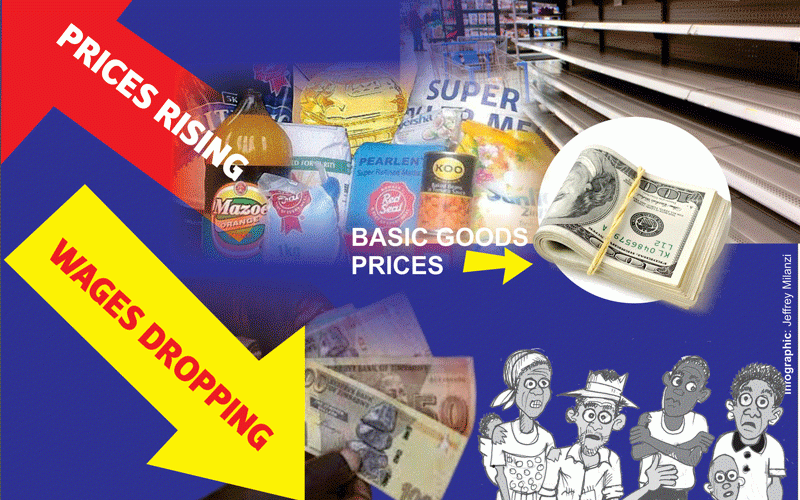
PRICE hikes have escalated in the past week, with the Zimbabwe dollar plummeting by 56,25% to US$1:ZW$2 000.
It was one of the steepest drops of Zimbabwe’s currency since bold policy changes came into force in 2019, when government reintroduced the local currency as the main medium of exchange, following a decade of dollarisation.
Businesses, under fire from the protracted volatilities, have responded by effecting waves of price hikes to avoid collapse.
But the price increases have been at a fast pace than individual income growth.
Zimbabwe’s consumer markets are seeing a repeat of product shortages, multiple prices and exchange rate volatilities that characterised the economy between 2006 and 2008, which ended with a currency collapse.
Reports emerged this week that rejection of the haemorrhaging Zimbabwe dollar had escalated, while some retailers were selling only a few products to trade in the local currency.
Reuben Aliki, director at the Combined Harare Residents Association (CHRA), said goods had been disappearing from supermarkets.
“Right now, I am walking into a big retail shop but I can’t see some goods,” Aliki told the Zimbabwe Independent on Thursday.
- Chamisa under fire over US$120K donation
- Mavhunga puts DeMbare into Chibuku quarterfinals
- Pension funds bet on Cabora Bassa oilfields
- Councils defy govt fire tender directive
Keep Reading
“In another shop popular brands like beverages from Delta Corporation are only being sold in US dollars. You can actually see that things are getting worse every time.
“Price increases are mostly in beverages, sugar and basics that we always buy like beans. But beans is locally produced by our farmers. Cooking oil prices are also soaring.
“Meat prices have also increased. Since January, we have seen meat prices increasing. I can no longer afford to buy meat. It is now cheaper to buy from tuckshops than retail outlets,” Aliki noted.
He said Harare residents were spending time in nearby farms looking for cheaper meat.
The United States Agency for International Development (USAid) says wheat flour, bread and sugar prices have surged by about 40% since February, while maize meal has rocketed by 60% in Harare.
Food prices have generally increased across the country, mainly in Zimbabwe dollars, following the continued depreciation of the Zimbabwe dollar.
“Wheat flour, bread and sugar Zimbabwe dollar prices increased significantly by about 40%, while maize meal prices increased nearly 60% in Harare since February. Vegetable oil and rice also increased by about 20%,” the agency noted in a food security report released last week.
“Relatedly, prices of wheat flour, maize meal, sugar and rice are over 400% to nearly 545% higher than last year in Zimbabwe dollars, with bread and vegetable oil prices increasing by around 240% to 300% in Zimbabwe dollars, compared to prices last year.
“The high and increasing food prices continue limiting household purchasing power, particularly households dependent on market purchases for food,” USAid said.
Confederation of Zimbabwe Retailers (CZR) president Denford Mutashu blamed price hikes on dollarisation.
He said suppliers to retailers were now demanding foreign currency.
“Price increases are driven by redollarisation that keeps squeezing out the Zimbabwe dollars from the market place. The legislated exchange rate continues to pose a dilemma to business. Most supply chains have dollarised with suppliers now preferring to be paid in US dollars and upfront,” Mutashu said.
“It is currently not possible to procure stocks exclusively in US dollars and sell at the official exchange rate. However, CZR urges business to exercise restraint as some had taken advantage of the situation to charge exorbitant prices.”
He said some practices were “unacceptable”.
“We are engaging all stakeholders to ensure the situation stabilises. The market should expect stability in a week or two. There is no need to press the panic button as business and government are working together round the clock to contain the situation,” Mutashu said.
In Harare, residents said they were feeling the heat. Tracy Nedewedzo, a resident of Highfield in Harare said: “The local currency keeps losing value and most employers have not adjusted salaries.
“That means the amount of goods that I can buy for my family keeps decreasing every month. If you buy mealie meal, sugar and cooking, you can’t even afford bread for your family for the rest of the month”.
Abigail Madhawure, another Highfield resident, said: “You go to the supermarket today just to check prices, Bally House drink is for a certain price. When you go back the next day the price has increased”






